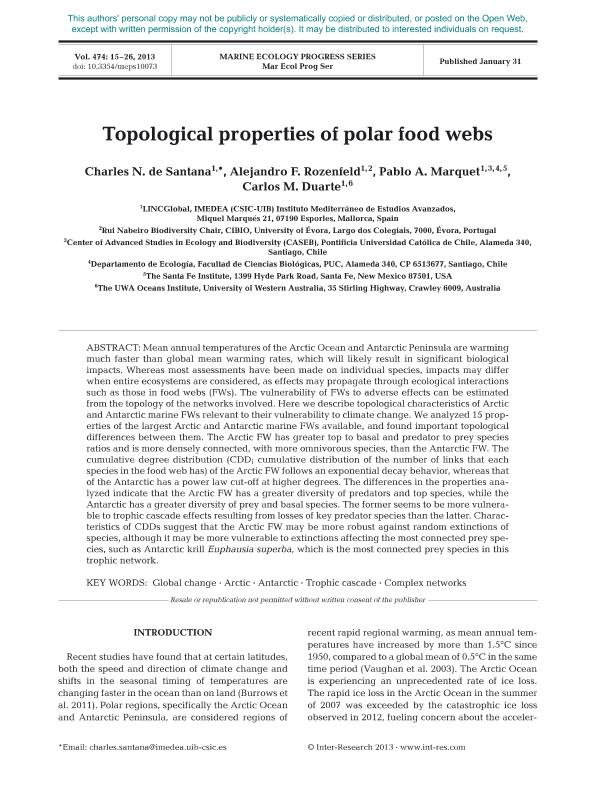Artículo
Topological properties of polar food webs
Fecha de publicación:
01/2013
Editorial:
Inter-Research
Revista:
Marine Ecology Progress Series
ISSN:
0171-8630
Idioma:
Inglés
Tipo de recurso:
Artículo publicado
Clasificación temática:
Resumen
Mean annual temperatures of the Arctic Ocean and Antarctic Peninsula are warming much faster than global mean warming rates, which will likely result in significant biological impacts. Whereas most assessments have been made on individual species, impacts may differ when entire ecosystems are considered, as effects may propagate through ecological interactions such as those in food webs (FWs). The vulnerability of FWs to adverse effects can be estimated from the topology of the networks involved. Here we describe topological characteristics of Arctic and Antarctic marine FWs relevant to their vulnerability to climate change. We analyzed 15 properties of the largest Arctic and Antarctic marine FWs available, and found important topological differences between them. The Arctic FW has greater top to basal and predator to prey species ratios and is more densely connected, with more omnivorous species, than the Antarctic FW. The cumulative degree distribution (CDD; cumulative distribution of the number of links that each species in the food web has) of the Arctic FW follows an exponential decay behavior, whereas that of the Antarctic has a power law cut-off at higher degrees. The differences in the properties analyzed indicate that the Arctic FW has a greater diversity of predators and top species, while the Antarctic has a greater diversity of prey and basal species. The former seems to be more vulnerable to trophic cascade effects resulting from losses of key predator species than the latter. Characteristics of CDDs suggest that the Arctic FW may be more robust against random extinctions of species, although it may be more vulnerable to extinctions affecting the most connected prey species, such as Antarctic krill Euphausia superba, which is the most connected prey species in this trophic network.
Palabras clave:
Antarctic
,
Arctic
,
Complex Networks
,
Global Change
,
Trophic Cascade
Archivos asociados
Licencia
Identificadores
Colecciones
Articulos(CCT - TANDIL)
Articulos de CTRO CIENTIFICO TECNOLOGICO CONICET - TANDIL
Articulos de CTRO CIENTIFICO TECNOLOGICO CONICET - TANDIL
Citación
de Santana, Charles N.; Rozenfeld, Alejandro Fabian; Marquet, Pablo A.; Duarte, Carlos M.; Topological properties of polar food webs; Inter-Research; Marine Ecology Progress Series; 474; 1-2013; 15-26
Compartir
Altmétricas




